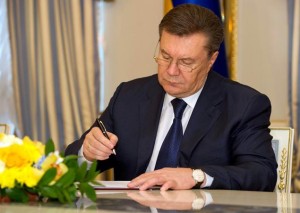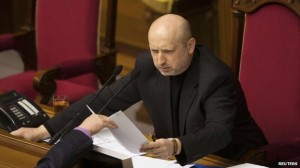redo Jump to...
print Print...
(from Reuters News Service, 2/21/14) KIEV–Ukraine opposition leaders signed an EU-mediated peace deal with President Viktor Yanukovich on Friday, aiming to end a violent standoff that has left dozens dead and opening the way for a early presidential election this year.

Ukrainian President Viktor Yanukovych signs the agreement with opposition leaders to end the crisis in the Presidential Palace in Kiev, Ukraine, on Friday.
Russian-backed Yanukovich – under pressure to quit from the mass demonstrations in Kiev – earlier offered a series of concessions to his pro-European opponents, including a national unity government and constitutional change to reduce his powers, as well as the presidential vote.
German Foreign Minister Frank-Walter Steinmeier said the deal provided for the creation of a national unity government and an early presidential election this year, although no date had been set. The vote had been due in March 2015. [The assembly subsequently began to vote to make the agreement law, supporting immediately a return to the constitution of 2004 and an unconditional amnesty for people detained in the current unrest.]
A Reuters correspondent at the signing in the presidential headquarters said Yanukovich did not smile during a ceremony lasting several minutes.
One of the European Union mediators, Polish Foreign Minister Radoslaw Sikorski, described the agreement as a “good compromise for Ukraine.” In a post on Twitter, he said it “gives peace a chance. Opens the way for reform and to Europe.”
The sprawling nation of 46 million with a shattered economy and endemic corruption is at the center of a geopolitical tug-of-war between Russia and the European Union. Protesters are seeking greater ties to the EU while many Russian speaking Ukrainians, mostly in the eastern half of the country, see themselves as more ethnically Russian and seek stronger ties to Putin and Russia.
The struggle between East and West Ukraine over Ukraine’s national and political identity is centuries old, but the recent violence was touched off when Yanukovich’s government suddenly pulled out a long negotiated trade agreement with the EU in favor of signing one that more closely allied Ukraine with Russia. The deal, and a multi-billion dollar Russian aid package to Ukraine, has since been frozen by the protests.
The health ministry said 77 people had been killed since Tuesday afternoon, which meant at least 47 died in Thursday’s clashes, the worst violence since Ukraine gained its independence from the Soviet Union in 1991.
The square, the site of much of the worst of Ukraine’s violence, appeared peaceful, with thousands of demonstrators chanting anti-government slogans interspersed with patriotic singing.
SETBACKS FOR PUTIN
The deal, if fully implemented, would be a setback for Russian President Vladimir Putin, who has made tying Ukraine into a Moscow-led Eurasian Union a cornerstone of his efforts to reunite as much as possible of the former Soviet Union.
In further diplomatic efforts, President Obama spoke to German Chancellor Angela Merkel who in turn discussed Ukraine with Russian President Vladimir Putin. Moscow has strongly opposed what it sees as Western interference in Moscow’s sphere of influence in Ukraine.
YANUKOVICH SUPPORT EBBS
After 48 hours in which the fate of Ukraine was fought out in the square, Yanukovich was rapidly losing support.
The deputy chief of the armed forces resigned and opposition deputies in parliament voted to overturn severe anti-terrorist laws enacted by Yanukovich’s government this month and ordered security forces back to barracks.
In another sign of the severity of the crisis, ratings agency Standard & Poor’s cut Ukraine’s credit rating for the second time in three weeks on Friday, citing the increased risk of default.
S&P said latest developments in the crisis made it less likely that Ukraine would receive desperately needed Russian aid. Ukraine cancelled a planned issue of 5-year Eurobonds worth $2 billion, it told the Irish Stock Exchange where the debt would have been listed. Kiev had hoped Russia would buy the bonds to help it stave off bankruptcy.
Russia’s economy minister said Moscow was still undecided on the next $2 billion installment and was awaiting clarity on the government in Ukraine.
On financial markets, Ukraine’s dollar bonds and the hryvnia currency firmed against the dollar from record lows hit this week on hopes for a deal.
However, RBS analyst Tatyana Orlova noted the country was still in dire financial straits. “This is not the end of the story. What I am reading is there is a deal but the devil is in the detail … The urgent need is for a technocratic cabinet that could take steps to avert default,” Orlova said.
On Thursday, EU foreign ministers meeting in Brussels imposed targeted sanctions* on Ukraine and threatened more if the authorities failed to restore calm. [*sanctions – an action that is taken or an order that is given to force a country to do something by limiting or stopping trade with that country, by not allowing economic aid for that country, etc. – usually plural]
Reprinted here for educational purposes only. May not be reproduced on other websites without permission from Thomson Reuters. Visit the website at Reuters .com.
UPDATE: ON SUNDAY, Feb. 23 at 8:42 PM UPI News reported:
The Ukrainian Parliament, which voted to remove President Viktor Yanukovych from office, named Speaker Oleksandr Turchynov as interim president Sunday. Turchynov said Ukraine must “return to the family of European countries” and will work more closely with the European Union. He then told Parliament it had until Tuesday to form a new unity government.

Ukraine’s new interim President, Oleksandr Turchynov, is considered the right-hand man of Yulia Tymoshenko, the former prime minister imprisoned by President Viktor Yanukovych.
“I want to make Ukraine a modern European country,” he said Sunday in a televised address. “If I can do that through the president’s position, I will do my best.
Parliament voted to seize Yanukovych’s luxury estate near Kiev, which protesters entered Saturday, the BBC reported. Yanukovych, who has refused to resign, has abandoned his estate and was blocked from taking a plane to Russia, RIA Novosti reported. Border Service spokesman Serhiy Astakhov said the plane did not have the documents required to cross the border.
Yanukovych then got into an armored car and drove away. He has left Kiev for Kharkiv, where he is meeting with his supporters, presidential spokeswoman Anna German said.
Questions
1. a) Who is the president of Ukraine?
b) Which country backs Ukraine’s president?
2. Why did Ukraine’s president sign a peace deal with the opposition on Friday?
3. What agreements have been made in the peace deal?
4. How is the country divided on support for and against the president?
5. What had set off the protests three months ago?
6. How will the peace deal between the president and protesters impact Russian President Vladimir Putin’s plans?
Background
Agreement on the Settlement of Crisis in Ukraine
Concerned with the tragic loss of life in Ukraine, seeking an immediate end of bloodshed and determined to pave the way for a political resolution of the crisis, We, the signing parties, have agreed upon the following:
1. Within 48 hours of the signing of this agreement, a special law will be adopted, signed and promulgated, which will restore the Constitution of 2004 including amendments passed until now. Signatories declare their intention to create a coalition and form a national unity government within 10 days thereafter.
2. Constitutional reform, balancing the powers of the President, the government and parliament, will start immediately and be completed in September 2014.
3. Presidential elections will be held as soon as the new Constitution is adopted but no later than December 2014. New electoral laws will be passed and a new Central Election Commission will be formed on the basis of proportionality and in accordance with the OSCE & Venice commission rules.
4. Investigation into recent acts of violence will be conducted under joint monitoring from the authorities, the opposition and the Council of Europe.
5. The authorities will not impose a state of emergency. The authorities and the opposition will refrain from the use of violence. The Parliament will adopt the 3rd amnesty, covering the same range of illegal actions as the 17th February 2014 law. Both parties will undertake serious efforts for the normalisation of life in the cities and villages by withdrawing from administrative and public buildings and unblocking streets, city parks and squares. Illegal weapons should be handed over to the Ministry of Interior bodies within 24 hours of the special law, referred to in point 1 hereof, coming into force. After the aforementioned period, all cases of illegal carrying and storage of weapons will fall under the law of Ukraine. The forces of authorities and of the opposition will step back from confrontational posture. The Government will use law enforcement forces exclusively for the physical protection of public buildings.
6. The Foreign Ministers of France, Germany, Poland and the Special Representative of the President of the Russian Federation call for an immediate end to all violence and confrontation.
Kyiv, 21 February 2014
Signatories:
President of Ukraine: Viktor Yanukovych
For the Opposition: Vitaliy Klichko, UDAR Oleh Tyahnibok, Svoboda Arsenij Yatseniuk, Batkivshchyna
Witnessed by:
For the EU: Poland Radoslaw Sikorski, Foreign Minister
Germany – Frank-Walter Steinmeier, Foreign Minister France – Laurent Fabius, Foreign Minister
For the Russian Federation – Vladimir Lukin, Special Envoy
(The deal was not signed by Vladimir Lukin, an envoy sent by Russian President Vladimir Putin. There was no immediate explanation for his absence.)
Read the agreement signed on Feb. 21 by Ukrainian President Viktor Yanukovich and the three opposition leaders at:
auswaertiges-amt.de/cae/servlet/contentblob/671350/publicationFile/190051/140221-UKR_Erklaerung.pdf
Daily “Answers” emails are provided for Daily News Articles, Tuesday’s World Events and Friday’s News Quiz.



